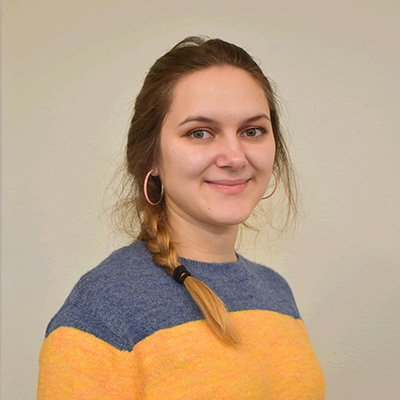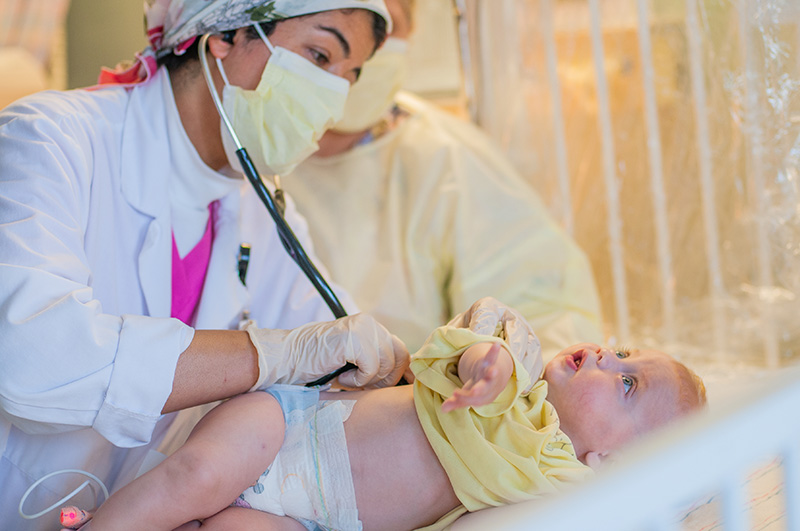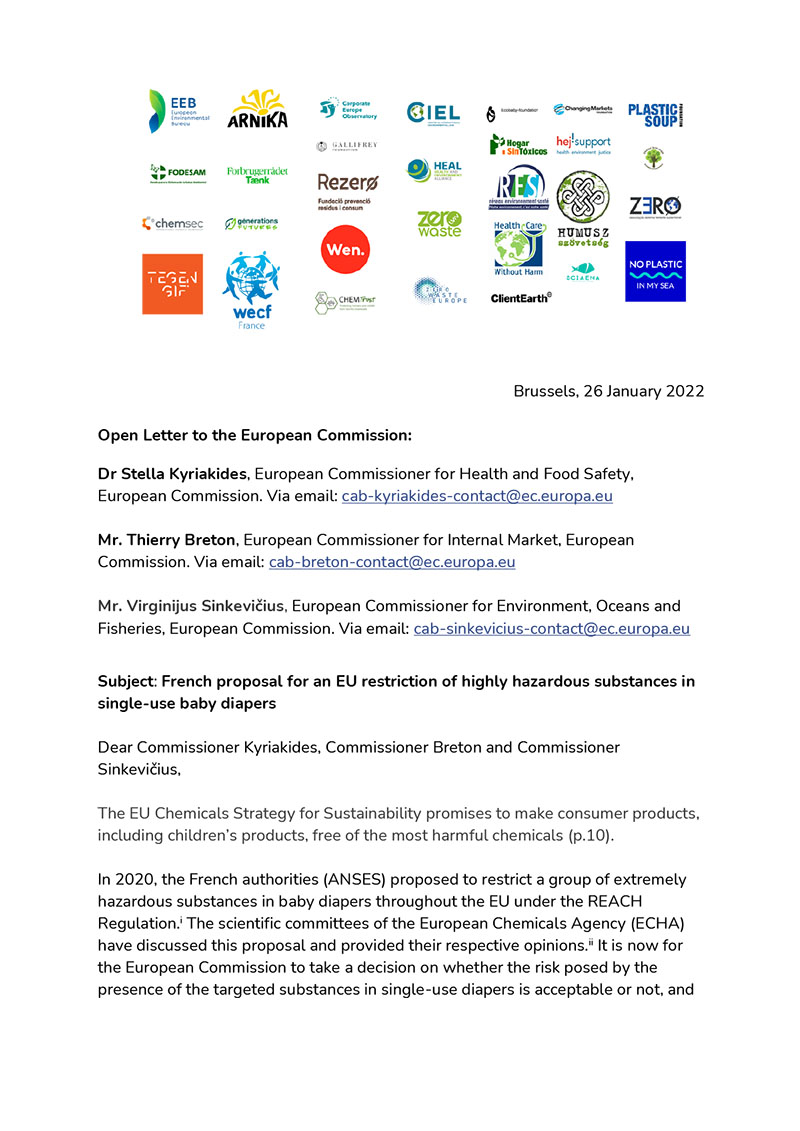Crunch time for the EU – restrict hazardous chemicals affecting infants

A blog post by Andreea Zotinca
Circular Healthcare Project Officer – HCWH Europe
Single-use diapers can contain hazardous chemicals including carcinogens and hormone disruptors. These chemicals not only pollute the environment, but can lead to serious health issues for infants wearing them. The European Commission is at a defining moment, and has the opportunity to restrict these substances and protect vulnerable infants.
Infants are vulnerable to the health risks of diapers
Harmful chemicals in diapers can migrate through urine and remain in contact with children’s skin, resulting in long periods of exposure. Approximately 14.5 million children in the EU are currently exposed to these chemicals. For the majority of their first 36 months, children wear diapers day and night, at an age when they are more vulnerable to chemical exposure. It is important to protect the most vulnerable groups and reduce exposure to hazardous chemicals wherever possible. Unfortunately, the European Commission is close to missing a crucial opportunity to prevent harmful exposures for young children.
Chemicals of concern found in diapers include:
- Phthalates
- Polycyclic aromatic hydrocarbons (PAH)
- Polychlorodibenzo-pdioxins (dioxins or PCDDs)
- Polychlorodibenzofurans (furans or PCDFs)
- Polychlorobiphenyls (PCBs)
- Formaldehyde
The health risks associated with these chemicals relate to endocrine, neurological, hepatic and immunological problems.

Protecting infants
An EU-wide restriction has been proposed for formaldehyde, PAHs, dioxins, furans, and PCBs to protect the health of babies. These chemicals are not intentionally added, but they are present in raw materials or residues from the manufacturing processes. The proposal, however, is not supported by the European Chemicals Agency (ECHA)’s Committee for Risk Assessment – whose stated opinion is that there is not enough scientific evidence to prove the risk and support this restriction. Crucially, the committee also announced, however, that they cannot completely rule out risks and recommend that these chemicals should be kept to the lowest possible levels in diapers.
The restriction can nonetheless still happen - the European Commission can still choose to protect vulnerable infants from exposure by going beyond ECHA’s opinion and restrict these chemicals in a precautionary approach, instead of allowing continued harm whilst waiting for more evidence.
Support for restriction
We are asking the European Commission to approve this restriction and stand by the ambitions of their EU chemicals strategy for sustainability, which seeks to phase out hazardous chemicals that affect vulnerable groups
 More than 30 civil society groups, including Health Care Without Harm Europe, sent a letter to the European Commission to support the proposed restriction, expressing concern that we will miss a crucial opportunity to protect children’s health.
More than 30 civil society groups, including Health Care Without Harm Europe, sent a letter to the European Commission to support the proposed restriction, expressing concern that we will miss a crucial opportunity to protect children’s health.
We are asking the European Commission to approve this restriction and stand by the ambitions of their EU chemicals strategy for sustainability, which seeks to phase out hazardous chemicals that affect vulnerable groups. It is a great opportunity to adopt the precautionary principle and not put children’s health at risk because some information is perceived to be missing - by the time the harm from these substances in diapers are sufficiently proven, millions of children will have already been exposed.
Reducing harmful exposure in healthcare
Healthcare professionals are an important and trusted voice on health - they can advocate for the protection of vulnerable patient groups.
Hospitals purchase diapers for both children and adults in large quantities – in some cases up to 8% of their total plastic waste is from diapers and incontinence wear. In support of their healing mission, healthcare providers can leverage their significant purchasing power to reduce harmful substances found in healthcare products by adapting purchasing criteria to phase out chemicals of concern.
Whilst sustainability certifications, such as the NordicSwan label, can support higher environmental standards and reduced hazardous substances in healthcare purchasing, they only regulate intentionally added substances, so they might not cover all harmful chemicals that are present unintentionally in diapers.
“Healthcare providers, clinicians, and nurses are pivotal in influencing both healthcare practice and procurement towards sustainability. It’s important that they provide a medical perspective to product decisions - considering patient safety and health – and support a phase-out of hazardous substances.”
- Diego Cattolica, National Coordinator, Environment
National Secretariat for Sustainable Public Procurement, Sweden
This is an important moment for the European Commission – not only is it an opportunity to protect vulnerable groups, but also a chance to demonstrate a serious and meaningful commitment to the ambitions of its chemicals strategy by restricting harmful substances in diapers.
Healthcare professionals are an important and trusted voice on health - they can advocate for the protection of vulnerable patient groups. If you are a healthcare professional, you can join the sustainable healthcare movement through one of our networks:
